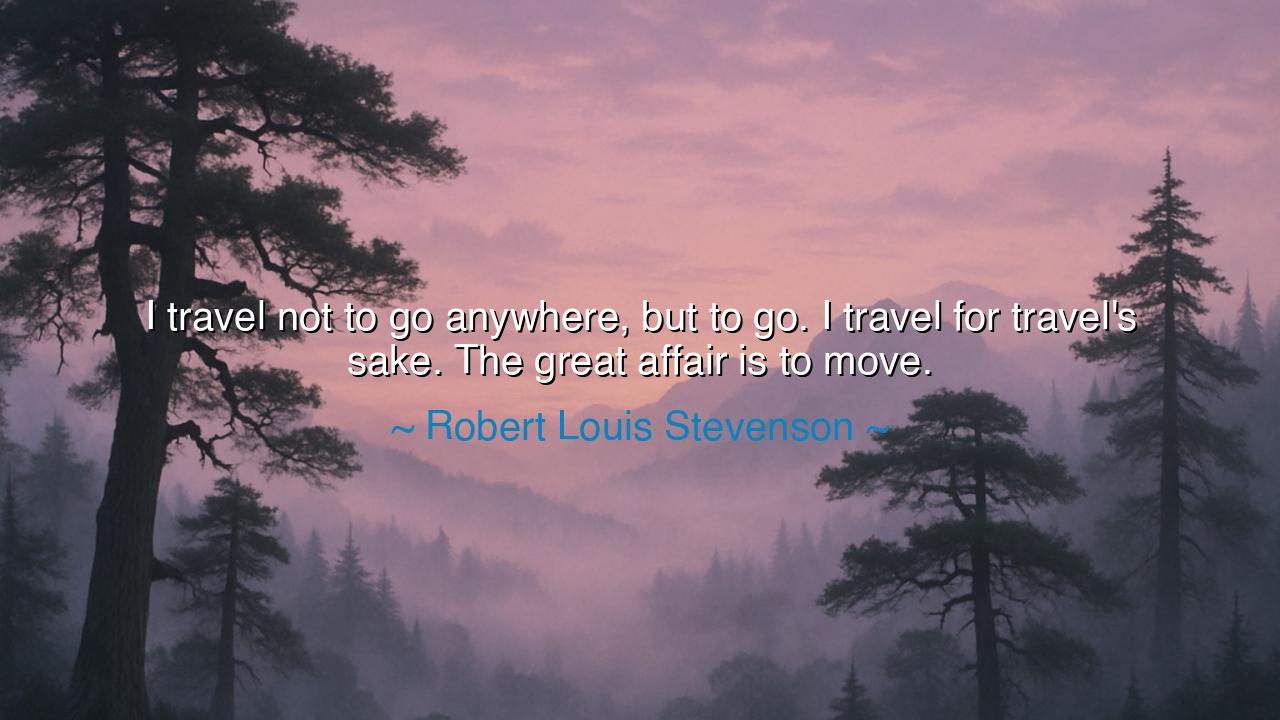
I travel not to go anywhere, but to go. I travel for travel's
I travel not to go anywhere, but to go. I travel for travel's sake. The great affair is to move.






Hear, O wayfarer of life, the words of Robert Louis Stevenson, who declared: “I travel not to go anywhere, but to go. I travel for travel’s sake. The great affair is to move.” These words carry within them a fire older than time—the fire of motion, of restless longing, of the soul’s need to journey not for destination, but for the sacred rhythm of the path itself. Stevenson, who wandered across lands and seas, spoke as one who knew that the act of going is itself the feast, the offering, and the revelation.
To travel is not merely to arrive. The wise understand that destinations are but illusions, fleeting pauses along the eternal road. The true gift lies in the act of moving, in the unfolding of the world step by step, horizon after horizon. Just as the river has no final resting place but flows endlessly into sea and sky, so too does the human heart find its vitality in motion. Stevenson’s words remind us that life is not conquered by stillness, but by the willingness to move, to change, to keep walking even when the path is uncertain.
Consider the journeys of Odysseus, the wanderer of Homer’s epic. His tale was not of swift return, but of long voyages, strange lands, and endless trials. Though his goal was Ithaca, the gods ordained that his story would be found in the going—in the sirens he heard, in the Cyclops he faced, in the storms he endured. Had he traveled only to arrive, his tale would have been but a whisper. Yet because he journeyed, he became immortal in memory. So too does Stevenson’s cry teach us: the great affair is not in the reaching, but in the moving.
There is also in these words the wisdom of freedom. For when a man travels for a destination, he binds his joy to an end; but when he travels for its own sake, he is already fulfilled with each step. The mountain does not wait for him, the city does not need him—yet the journey itself is his treasure. Thus, Stevenson teaches us to unshackle ourselves from the tyranny of ends, to love the act of becoming, of venturing, of moving forward for no reason other than the joy of motion.
O seeker, reflect upon this: even in the stillness of your daily life, the great affair is to move—in mind, in heart, in spirit. The scholar moves through books, the artist through visions, the pilgrim through silence, the wanderer through roads. It is not stagnation but motion that shapes the soul. To remain unmoved is to wither; to move is to live.
Learn from this teaching a lesson both simple and profound: do not wait for the perfect destination, the perfect plan, the perfect reward. Begin. Walk. Set forth, even if the path is uncertain. Love the very act of striving, for in striving you are already alive. Whether across oceans, across deserts, or across the quiet corridors of your own growth, let movement be your companion.
Practical action lies before you: seek not only journeys of the body, but journeys of the soul. Take a road without knowing fully where it leads. Begin a task for the joy of beginning, not merely for the reward. Choose motion over fear, change over stagnation. For as Stevenson declared, the great affair is to move—and in movement, you will find the eternal dance of life itself.
Thus I say to you: cherish not only the arrival, but the going. Be like the river that flows, the wind that wanders, the star that circles the heavens. For to travel for its own sake is to understand the secret of existence: that life is not a place to reach, but a path to walk. And those who move shall never perish, for they live in the very rhythm of eternity.






AAdministratorAdministrator
Welcome, honored guests. Please leave a comment, we will respond soon